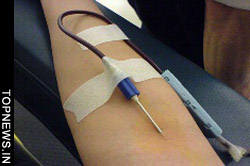Ban on Gays’ Blood Donation Stays
 France, Italy and Spain may have lifted the ban on gay men’s blood donation, however, Scotland’s blood transfusion service, despite calls from gay men’s groups, has refused to do the same.
France, Italy and Spain may have lifted the ban on gay men’s blood donation, however, Scotland’s blood transfusion service, despite calls from gay men’s groups, has refused to do the same.
A petition to the Scottish Parliament demanded a review of the donation rules to let healthy gay and bisexual men give blood.
In evidence to a petition to the Scottish Parliament or Holyrood’s petitions committee, demanding a review of blood donation rules, Scottish National Blood Transfusion Service states, rising HIV in gay men makes donor selection not only imperative, but the only way to keep blood products safe. Further, it says the ban is not meant to be discriminatory, rather it is the outcome of numerous risks associated with certain types of sexual behavior.
Despite safe sex campaigns, 86% of all new HIV infections in Scotland in 2007, appeared amongst men who had had sex with men, and though all blood donations undergo thorough testing for HIV, hepatitis B and C and syphilis, not all early stage infections get picked up. The above figures serve to highlight the fact that despite the ban on blood donation by gay men, they continue to give blood, even when asked not to.
While, gay and lesbian groups continue to protest against the ban, arguing that men who have had unprotected sex with an HIV-positive partner are allowed to donate blood after one year of the incident, the Terence Higgins Trust continues to support the present transfusion policy.
However, gays are not the only ones not allowed to donate blood, anyone who has had unprotected sex with a prostitute and anyone who has had unprotected sex in a high-risk HIV country like sub-Saharan Africa, including sex with an intravenous drug-user in the past 12 months is banned from donating blood.
The Scottish National Blood Transfusion Service, to prevent someone’s blood transmitting infection to whoever receives it, has also placed restrictions for blood donation from the following people:
1. People who have travelled abroad within the past 12-months and been exposed to malaria.
2. People who inject drugs, since this puts them at a higher risk of picking up infections.
3. People whose lifestyle exposes them to HIV or hepatitis infection.
4. People who have had an ear or body piercing or tattoo within the past year.
5. Following someone contracting vCJD through blood transfusion, anyone in the UK, who has received a blood transfusion since 1980, cannot donate blood as there is currently no test for the disease.